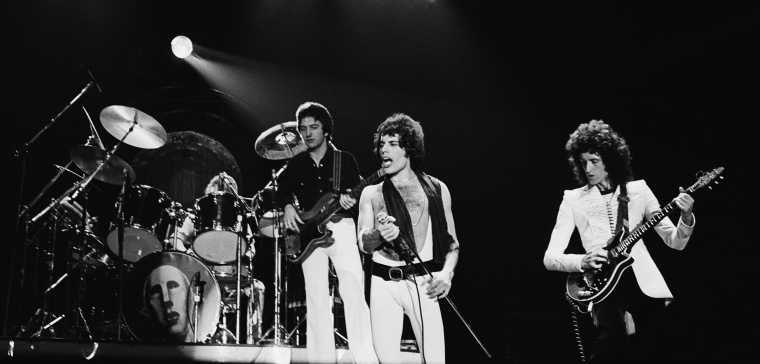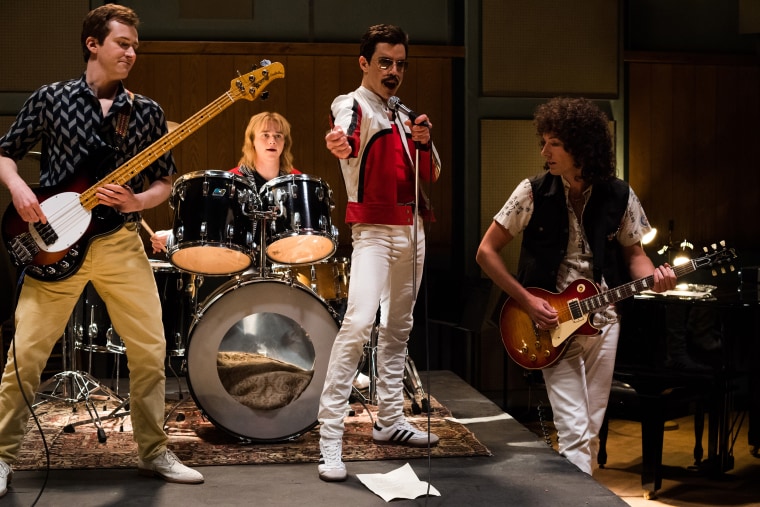One day, someone will make the biopic Freddie Mercury deserves. Today is not that day.
On paper, “Bohemian Rhapsody” seems like it should be a fantastic film. It has a complex and wildly talented genius, cut down before his time by a plague the homophobic Western world refused to take seriously. It has the music of Queen, which is still as fresh and thrilling as when it was first written. It has casting that ranged from impeccable to inspired in the case of Rami Malek.
So what went wrong? How could the story of one of the most fascinating figures in rock music descend into a color-by-numbers tale more suitable for VH1 than the Academy Awards?
The answer has a lot to do with the film’s origins. The project spent nearly a decade kicking around Hollywood, with Sacha Baron Cohen attached to play the singer back in 2010. Already recognized for his singing talent in “Sweeney Todd” and at the time getting ready to co-star in the film adaptation of “Les Misérables,” he seemed a perfect fit. But after three years and little progress, Cohen walked away from the part.
The problem, as he explained it, stemmed from the keepers of Queen’s musical rights, Brian May and Roger Taylor. May and Taylor — Queen's guitarist and drummer, respectively — had a very different movie in mind, one where they were the main stars and Freddie’s ordeal was something they’d overcome on the way to even more greatness. The film then languished until Rami Malek was hired to take on the part of Mercury. But Malek clashed with the director Bryan Singer; one day Singer too walked off the set and never came back.
"Bohemian Rhapsody" reduces Mercury to just another fallen rock and roller, with no grasp of what makes his story so triumphant and also so tragic.
The movie was completed by the assistant directors, and thankfully it did not end up being totally filtered through the hazy memories of Mercury’s remaining bandmates. But that doesn’t mean it’s a great film, or even a good one. In the end, "Bohemian Rhapsody" reduces Mercury to just another fallen rock and roller, with no grasp of what makes his story so triumphant and also so tragic.
Take for instance the opening vignette, where Brian May and Roger Taylor are portrayed as two dudes in a perfectly good band who take on Mercury on of necessity. In subsequent scene after scene, with managers, lawyers and record executives, Taylor and May are seen politely sitting on the couch, sipping tea, while Mercury is portrayed as a difficult diva. Not that May and Taylor disagreed with Mercury's music — they knew enough to go along with his genius. (So did bassist John Deacon, who, unlike May and Taylor, is not listed as an executive producer of the film, perhaps explaining why he winds up as an afterthought in many scenes.) The result is a movie that feels desperate to portray Taylor and May as the steady, responsible musicians who tried (and failed) to save their friend from himself.

This is tragic, because Malek is so good as Mercury. Like, career-defining good. Moreover, the rest of the cast does a great job in support of Malek. You will believe Gwilym Lee is Brian May’s younger self and Ben Hardy does a great job as Taylor’s egotistic counterpart to Mercury. Only Joseph Mazzello as Deacon doesn’t always come off as believable; once he loses the early 1970s wig, though, he improves enormously. And then of course, there’s the genius stunt casting of Mike Myers as the EMI record exec who insists long-haired hooligan teens won’t rock out to the song “Bohemian Rhapsody” in their cars, a perfect homage to 1992’s “Wayne’s World” use of the song.
But the acting can’t hide the film’s substantial plot flaws. As Mercury descends into drugs and debauchery, the other band members are shown looking uncomfortable and confused. They are heterosexual foils to his free-loving free spirit.
Speaking of which, the film’s issues with Mercury's sexuality are glaring. Early on, Mercury is shown to be madly in love with a woman, Mary Austin (Lucy Boynton). She is portrayed as a stabilizing influence, and during their relationship Mercury's music is great. But once Mercury starts exploring his sexuality, he starts to slip. High and in the thrall of manager Paul Prenter (Allen Leech, playing very against his best known “Downton Abbey” role), Mercury makes a series of bad decisions culminating in Queen nearly missing out on the opportunity to perform at Live Aid. In other words, the film seems to suggest that gay clubs can lead to drugs which can lead to increasingly poor choices and, eventually, AIDS. Nancy Reagan would give this film the D.A.R.E. seal of approval.
Even worse, the film leads with this plotline. Mercury is shown telling the band he has HIV one week before their Live Aid performance. Even for this genre, the historical revisionism feels particularly egregious, inserted to make the other bandmates seem compassionate, yet stoic. Live Aid happened in 1985, but Mercury was not believed to have been diagnosed until 1987. The movie attempts to insist his scene-stealing performance at Live Aid was a final hurrah of glory in the face of certain death. In truth, it was just Freddie being Freddie, doing his thing on stage.
That the people behind this movie are too unimaginative to understand this simple fact encapsulates so many of the problems with the film. In re-staging the Live Aid performance in full (it takes up the final 20 minutes, the movie captures what made Mercury such an electric performer. But it also throws into sharp relief how little the rest of the film understood about what made him so special.

